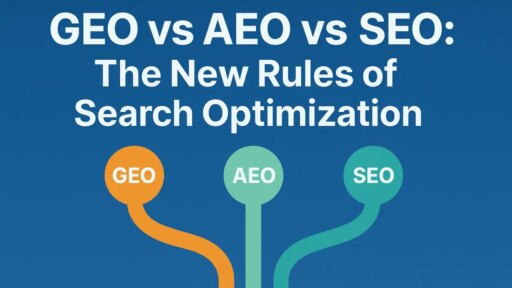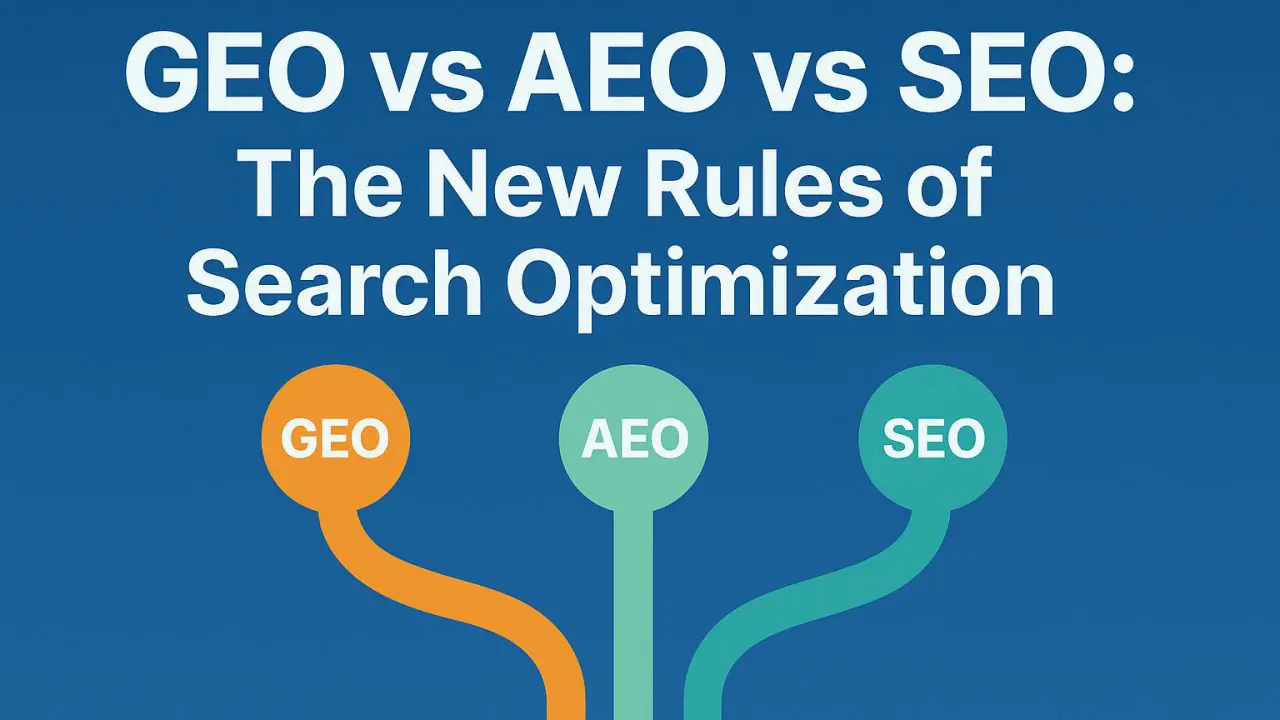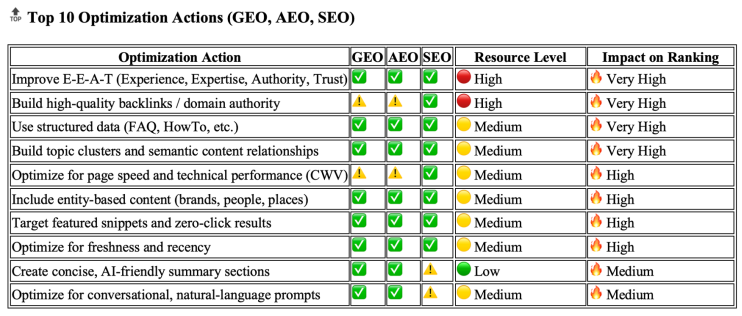The SEO industry is facing new challenges (story of my life). One of them is an old issue: Google continues to push organic results further down the page by adding more SERP features that compete with the traditional 10 blue links. It started with ads, then “People Also Ask” and instant answers, now it’s AI Overviews. As a result, SEOs must also focus on AEO (Answer Engine Optimization).
The second challenge is new: Users are increasingly leaving traditional search engines in favor of AI-based search engines like ChatGPT and Gemini, which provide link-free answers, offering less opportunity for websites to generate traffic. To adapt, SEOs now need to embrace GEO (Generative Engine Optimization).
Definition
Optimizing content and websites to rank higher on traditional search engines (Google, Bing).
Optimizing content to appear in AI-powered search engines like ChatGPT, Gemini, and Perplexity.
Optimizing for voice assistants and answer boxes that deliver one best answer (Google Assistant, Siri, Alexa).
Primary Goal
Achieve visibility in blue links and drive organic clicks.
Earn visibility and mentions in AI-generated answers, summaries, and citations.
Become the preferred single answer for spoken or featured responses.
Optimization Focus
Keywords, backlinks, on-page SEO, technical SEO, UX.
Data structure, factual accuracy, EEAT signals, AI-friendly citations.
Conversational phrasing, schema markup, FAQs, voice intent alignment.
Content Style
Long-form, keyword-rich, SEO-structured.
Concise, factual, citable, and multi-format.
Short, natural-language answers for direct responses.
Ranking Signal Priority
Authority (links, CTR, dwell time).
Credibility, freshness, structured markup, brand mentions in AI datasets.
Schema alignment, context clarity, conversational tone.
User Interface Targeted
Google Search results (10 blue links).
AI assistants, chatbots, and generative answer panels.
Voice assistants and zero-click environments.
Measurement Metrics
Rankings, traffic, CTR, bounce rate.
AI citation frequency, visibility in AI responses.
Featured snippet share, voice query appearances.
Content Formats
Blogs, service pages, landing pages.
Q&A, datasets, EEAT-enhanced content.
FAQs, schema data, concise explainers.
Core Tools
Google Search Console, Ahrefs, SEMrush.
Perplexity dashboards, ChatGPT query tracking, AI rank visibility tools.
Schema validators, voice optimization tools, AnswerThePublic.
Outcome
Traffic growth and lead generation from search engines.
Brand inclusion and visibility in AI-generated summaries.
Greater brand recognition in voice and zero-click ecosystems.
While this may seem like an existential threat to SEO, it’s not. The industry simply needs to adjust. Here’s how:
Adjust Your Keyword Strategy
AI Overviews are not shown for every keyword. Some keywords are what we call “AI-immune”:
- Service-based keywords (e.g. plumber near me, plumber Toronto) are unlikely to trigger AI answers. These behave like a digital version of the Yellow Pages, users are looking for a provider, not an answer. Google knows that, and so does ChatGPT. These keywords will continue to return local packs, ads, and blue links, just like they have for years.
- Local keywords in general (those that include cities or regions) are also less likely to be answered by generative AI and are more likely to produce clicks.
Keywords That Trigger AI Overviews
Most informational queries (e.g. what is life insurance, how does SEO work) do trigger AI Overviews. These often result in zero clicks. That must be factored into content strategy and traffic forecasting—especially for top-of-funnel content.
Audit your keyword set and categorize them:
- Which keywords still offer SEO opportunity (i.e., no AI overview)?
- Which keywords can benefit from AEO (Answer Engine Optimization)?
- Which ones align with GEO (Generative Engine Optimization)?
When resources are limited, focus on traditional SEO keywords—SEO, AEO, and GEO share many optimization actions, so there is efficiency in overlap.
Choose Your Optimization Focus
AEO and GEO share several optimization tactics with SEO. I asked ChatGPT to show me the most impactful actions across SEO, AEO, and GEO, and here’s the table it produced:
I want to divide the table below into two groups of actions: on-page and off-page (sound familiar?).
My advice is to focus on the resource-intensive areas. Most items in the table above are relatively easy to implement using ChatGPT. But when it comes to SEO, GEO, and AEO, the three magical words are:
Authority. Experience. Trust.
These are the most difficult areas for businesses to master—and that’s exactly why you should focus on them. Here’s how SEOs can help build each one:
Authority
No search engine will tell you exactly how authority works, but one thing is clear: Earning backlinks, and even brand mentions, from trusted websites (especially in your niche) remains one of the most important ranking signals. Why? Because it involves human vetting. When a credible site links to you, it’s validating your content’s value.
Experience
To build real experience signals, you need to do more than repackage what’s already out there. Be a true subject matter expert. That means going beyond basic search-based content and investing in original formats:
- Video tutorials
- Whitepapers
- Case studies
- Proprietary research
AI may be able to rephrase content, but it can’t replicate first-hand expertise.
Trust
Authority and links are part of trust, but it goes deeper.
To build trust, businesses need to demonstrate consistency, credibility, and reputation across the web. Here’s how SEOs can help:
- Strong branded profiles on platforms like YouTube, LinkedIn, and even industry-specific forums help show that real people stand behind the business.
- Online reviews, especially on Google, Trustpilot, Yelp, and niche directories, are major trust signals. The volume, sentiment, and recency of reviews are often used by both traditional search engines and AI tools to assess legitimacy.
- Consistent branding and NAP (Name, Address, Phone) data across directories and citations also contribute to perceived trust.
Search engines are looking for more than just content, they’re looking for businesses that people trust in the real world. Your online presence should reflect that.
Conclusion
To stay competitive, SEOs must evolve. GEO and AEO aren’t replacing SEO, they’re expanding on it. Focus on search intent, build your strategy around AI-driven experiences, and double down on authority, experience, and trust.
I have published another post explaining more how to adjust your existing SEO strategy to work with AI search engines.








